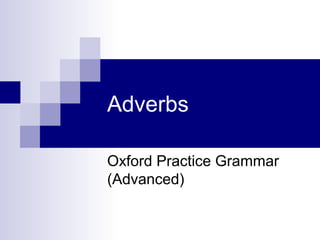
Adverbs
- 2. What are adverbs? Adverbs can modify: VERBS ADJECTIVES OTHER ADVERBS SENTENCES She always does everything really thoroughly and seems totally dedicated to her job.
- 3. Position of Adverbs (I) Usually immediately BEFORE the ADJECTIVES and ADVERBS they modify. It’s nearly complete. Is it politically correct? She did it fairly easily. He spoke very quietly.
- 4. Position of Adverbs (II) When modifying VERBS or SENTENCES, adverbs can appear IN FRONT or END POSITION of the clause or sentence. Usually I have a piece of toast and orange juice in the morning. I might have a snack later. In MID POSITION after BE or AUXILIARY. Some people are always hungry when they wake up. BEFORE the MAIN VERB I really prefer to wait a while before eating.
- 5. We do not put adverbs between a verb and its object: (x) I drink sometimes coffee
- 6. Adverbs of PLACE and TIME Used to add information on LOCATION or DIRECTION Usually in END POSITIONS Before adverbs of time: recently, tomorrow I slipped and fell backwards I haven’t been abroad recently
- 7. Adverbs of FREQUENCY Adverbs of DEFINITE FREQUENCY (annually, daily, twice…) in END POSITION. Rooms are cleaned daily. I’ve seen that film twice. Adverbs of INDEFINITE FREQUENCY (ever, often, usually…) in MID POSITION. It usually rains in the evening. Does he ever study?
- 8. Expectation Adverbs (I): ALREADY Used to express a connection between events and expectations ALREADY: MID or END position (the event is earlier than expected) His plane has already arrived. Mrs Black had left already.
- 9. Expectation Adverbs (II): STILL STILL is used to say that something is going on longer than expected, usually in MID position. We are still waiting.
- 10. Expectation Adverbs (III): NO LONGER, NOT…ANY LONGER/MORE Used when an event was expected to continue but it did not. Usually in MID or END position: It no longer works. We couldn’t stay there any longer. She doesn’t live here any more.
- 11. Expectation Adverbs (III): YET YET (=up to now) is used to show that an event is or was expected. Usually at the END of QUESTIONS, NEGATIVES and EXPRESSIONS OF UNCERTAINTY Have you read it yet? Classes haven’t started yet. I’m not sure if he’s finished yet.
- 12. Focus Adverbs: EVEN, JUST, ONLY Used to draw attention to ONE part of the sentence: She was only joking. He can’t even swim. Her research isn’t just about English. We can change the focus and the meaning by changing the position of the adverb: Mark only works here on Fridays (only Fridays) Only Mark works here on Fridays (only Mark)
- 13. Degree Adverbs (I) Used to say to what extent something is done or felt. REALLY, COMPLETELY, TOTALLY, … He totally forgot. She really hates fish. We failed completely. PRETTY, QUITE, RATHER: before adjectives and adverbs They’re pretty good. It’s quite tasty.
- 14. A BIT, A LITTLE (we don’t use them with adjectives before nouns) She’s feeling a little tired. The music is a bit loud. (NOT: It’s a bit loud music) We don’t use VERY before verbs
- 15. Degree Adverbs (III) MORE/LESS and MOST/LEAST are used as degree adverbs in comparatives and superlatives. Going by train can be more convenient and less expensive. TOO before adjectives and adverbs; ENOUGH after them It’s too difficult. Is this box big enough?
- 16. Adverbs of MANNER (I) Used to say how something is done. Usually in END position. I’ll read it carefully. They searched the room quickly and thoroughly.
- 17. Adverbs of MANNER (II) Angrily Anxiously Cheerfully Gloomily Impatiently Passionately seriously
- 18. VIEWPOINT Adverbs Used to describe the perspective or point of view being considered. Usually in END position or in FRONT position with a comma. It was not done scientifically. Financially, the project makes sense.
- 19. COMMENT Adverbs (I) Used to include a comment or opinion about what is said or written. Usually in FRONT or END positions. The adverb PROBABLY can appear in MID position. It was probably a misunderstanding. Surprisingly, he failed. I’ll refund the cost, of course.
- 20. COMMENT Adverbs (II) We use DEFINITELY and OBVIOUSLY to say how sure we are. I’ll definitely call you tonight. Obviously, someone forgot to lock the door. We use FORTUNATELY and SERIOUSLY to say how we feel. Fortunately, no one was injured. We’re seriously thinking about moving.
- 21. COMMENT Adverbs (III) Actually Apparently Certainly Frankly Honestly No doubt Presumably sadly
Editor's Notes
- NEVER AT THE BEGINNING: Already Mrs Black had left. (X)